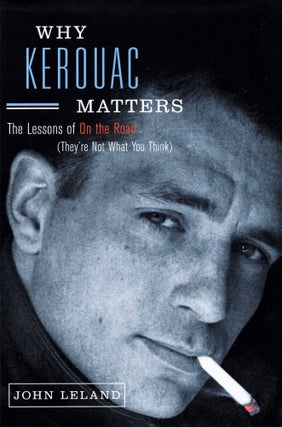Why Kerouac Matters: The Lessons of On the Road (They’re Not What You Think!) with: Ephemera
New York, NY: Viking Penguin, 2007. First Printing. Hardcover. “’My writing is a teaching,’ Kerouac noted in his journal, and this was the point, even if readers didn’t get it at first. ‘One of the greatest incentives of the writer is the long business of getting his teachings out and accepted,’ [Kerouac also wrote]. He was twenty-six when he started ‘On the Road,’ shaking off a brief failed marriage and the death of his father, embarking on the next phase of his life. The new book would teach the way. To prepare he wrote down eleven ‘true thoughts’ about himself, many of them vanities he hoped to overcome along his characters’ travels. ‘I’m ready to grow up if they’ll let me,’ he wrote. The product of his labors, he was sure, would be a ‘powerful and singularly gloomy book…but good.’ In due course the narrator leans and dispenses many lessons, often in the form of parables and revelations, providing a guide to alternative adulthood: What Would Jack Do? Contrary to its rebel rep, ‘On the Road’ is not about being Peter Pan; it is about becoming an adult.” (from Back Cover). John Leland’s “Why Kerouac Matters” focuses not on the exuberance and virile escapades of Dean Moriarty, but on Sal Paradise, on “…the lessons that Paradise absorbs and dispenses on his novelistic journey to manhood.” Leland riffs on “…how those lessons—about work and money, love and sex, art and holiness—still reverberate today.” Leland goes even further, contending that OTR “…is a primer for male friendship and the cultivation of traditional family values,” and that “…the stereotype of the two wild and crazy guys obscures the novel’s core themes of the search for atonement, redemption, and divine revelation.” Given the lack of “growing up” that both of these men (Kerouac and Cassady) themselves did in their own lives, it would seem that Leland has some work to do in bending his thesis into accepted “facts” of analysis-based scholarship. Yet the writing is good, and Leland does much to achieve his aim, unique and challenging as his thesis may be when compared alongside the ocean of extant Kerouac analysis. Added to this lot is a piece of ephemera from the publisher, a “Publisher’s Mock-Up” of the cover with nothing on verso. Book in very fine condition, essentially as new. Dust-jacket in equally very fine condition, alluringly clean; ephemera equally pristine and undamaged. Very Fine / Very Fine. [Item #4707]
Price: $30.00


![[Item #4707] Why Kerouac Matters: The Lessons of On the Road (They’re Not What You Think!) with: Ephemera. John Leland, Jack Kerouac.](https://thirdmindbooks.cdn.bibliopolis.com/pictures/4707.jpg?width=768&height=1000&fit=bounds&auto=webp&v=1635272166)




